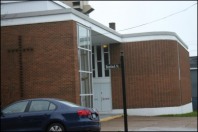By Michael Gorman
The Chronicle-Herald
December 4, 2010
http://thechronicleherald.ca/NovaScotia/1215277.html
[Church Property Sales Web site]
[FINANCIAL AND LEGAL ADVISORY COMMITTEE]
 |
| The former Sydney Diocesan Pastoral Centre in Sydney is one of the buildings that has sold. |
The Diocese of Antigonish has sold two properties and has pending sales on 16 others as it tries to raise money for a settlement with victims of alleged sexual abuse.
A website created to list real estate available in the seven counties covered by the northeastern Nova Scotia diocese features 31 properties.
Of those, 16 are listed as pending sales.
If all the sales go through, they would bring in about $1.24 million, based on the prices listed on the website.
"It would indicate that offers have been accepted on those," said Rev. Paul Abbass, spokesman for the diocese.
"They’d be pretty close to being finished."
The diocese is trying to raise $15 million for a class-action settlement with alleged victims of sexual abuse from the 1950s until 2009.
An additional $3 million is being raised to address the cost of any potential individual actions against the church.
The former bishop of the diocese, Raymond Lahey, helped negotiate the $15-million settlement. He faces trial in May on charges of possessing and importing child pornography in 2009.
The two properties sold are the former Sydney Diocesan Pastoral Centre and a property in St. Josephs, Antigonish County. The diocese did not release the amount of money raised from the sales.
It’s believed that as many as 400 properties will have to be sold to reach the target amount. At the moment, the diocese is putting land and unused buildings up for sale before turning to halls and other spaces that communities might use. Properties for sale are listed at www.churchpropertysales.info.
In each case, a property is offered to its respective parish before it’s added to the general sale list, said Abbass.
The diocese has someone whose full-time job is to evaluate each property. Vacant lots are inspected to ensure there are no former or inactive graveyards, and other pastoral concerns are reviewed for each property. At that point, properties go to the real estate committee, which meets once a week.
From there, Abbass contacts the parishes involved in the sales.
"They have two weeks to exercise their first right of refusal," he said.
"When the parish writes back and says they wish to purchase, which really hasn’t happened, they’d be asked to just help us understand how they’re going to pay for it and what are the conditions and that sort of thing."
Some parishioners have expressed concern about the possibility of losing spaces that play a role in the community and, in some cases, that they helped pay for.
It is a difficult subject for all parties, but Abbass said the church does what it can to keep people informed and help them understand that the sales aren’t happening because the church wants to sell the properties.
"This is a matter of trying to correct, or at least address ourselves, to an injustice of the past. This is about victims and this is about restitution and this is about accountability," said Abbass.
"Perhaps if we understand that this is our opportunity to do the right thing, then maybe that helps a little bit."
Contact: mgorman@herald.ca
Any original material on these pages is copyright © BishopAccountability.org 2004. Reproduce freely with attribution.